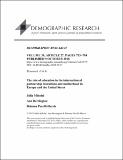The role of education in the intersection of partnership transitions and motherhood in Europe and the United States
Abstract
BACKGROUND Previous research has shown that partnership status at first birth is associated with education across Europe and the United States. Most research has indicated that first births within cohabitation have a negative educational gradient. However, the pathway to a first birth in different partnership types can be complex and may vary across countries. OBJECTIVE We study whether any educational differences observed at the time of a first birth are produced upon entrance into cohabitation, during the transition from cohabitation to marriage, or during the transition to first birth. METHODS Using data from the Harmonized Histories we estimate multi-state event history models to examine how educational differences in patterns of early family formation emerge among women born between 1950 and 1969 in 16 European countries and the United States. RESULTS The results highlight three main findings. First, the educational gradient of entry into cohabitation is inconsistent across countries. Second, regardless of the educational gradient of entry into cohabitation, the transition to a first birth among cohabiting women has a consistent negative educational gradient across countries. Last, the transition from cohabitation to marriage has a consistent positive educational gradient across countries. CONTRIBUTION Across Europe and the United States, educational differences matter the most during the transition from cohabitation to marriage and the transition to first birth once women are in a cohabiting union. Entrance into cohabitation is common, but key educational distinctions emerge upon childbearing. Disadvantaged women are less likely to marry before having a baby, while highly educated women marry before childbearing.
Citation
Mikolai , J , Berrington , A & Perelli-Harris , B 2018 , ' The role of education in the intersection of partnership transitions and motherhood in Europe and the United States ' , Demographic Research , vol. 39 , 27 , pp. 753-794 . https://doi.org/10.4054/DemRes.2018.39.27
Publication
Demographic Research
Status
Peer reviewed
ISSN
1435-9871Type
Journal article
Description
Júlia Mikolai was a PhD student at the Department of Social Statistics and Demography at the University of Southampton and was funded by a scholarship provided by the Economic and Social Research Council (ES/J500161/1) while completing most of this work. Ann Berrington was funded through the ESRC Centre for Population Change (ES/K007394/1). Brienna Perelli-Harris received funding from the European Research Council under the European Union's Seventh Framework Programme (FP7/2007-2013)/ERC grant agreement number 263794 CHILDCOHAB.Collections
Items in the St Andrews Research Repository are protected by copyright, with all rights reserved, unless otherwise indicated.

